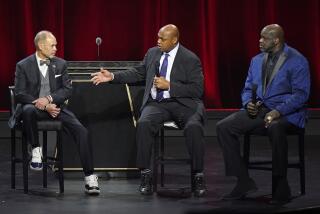McCain is prepping legislation to overhaul pay-TV business
The maverick wants to cook the TV industry’s golden goose.
Sen. John McCain (R-Ariz.) is preparing to introduce legislation perhaps as early as Thursday that would dramatically overhaul the television business and will probably be met with strong opposition from the broadcast and cable industries if it ever gets off the ground.
Specifically, McCain wants to require pay-TV distributors to give consumers the option to buy channels on an individual or a la carte basis instead of the current system in which they must buy large bundles of channels.
PHOTOS: Cable vs. broadcast ratings
He is also interested in protecting Aereo Inc., the start-up that delivers the signals of broadcast TV networks -- including CBS, Fox and ABC -- to consumers via the Internet. Broadcasters say Aereo’s service violates copyright laws and are suing in an attempt to shut it down.
Fox and CBS have even threatened to take their programming off broadcast TV and create cable channels if Aereo wins in the courts. Broadcasters are currently paid by cable and satellite operators for their channels, and they fear that if Aereo survives, it could threaten that revenue stream.
According to Washington insiders briefed on McCain’s plans, the senator’s proposed legislation would give the Federal Communications Commission the power to strip the licenses of any broadcaster that moves to a cable model.
Many of the details of McCain’s proposed bill are still sketchy, and his office would only confirm that he is drafting a la carte legislation.
This is not the first time McCain has tried to push a la carte on the television industry. A previous effort in 2006 failed to gain much momentum.
PHOTOS: Celebrities by The Times
The second time may not be the charm. McCain is no longer a member of the Senate Commerce Committee, which has oversight over the FCC and the media industry, and top lobbyists doubt he still has the juice to push the bill through.
Next week, the Senate Commerce Committee is set to hold a hearing on the state of the industry, and top lobbyists from the cable and broadcast industries are scheduled to testify. McCain’s office is scrambling to have proposed legislation ready.
The issue of selling cable channels in bundles has divided much of the media industry. Although many consumers blame the cable and satellite operators for how channels are sold, the reality is that it is often the programmers who dictate the terms.
Big media companies such as Viacom, Walt Disney and News Corp. typically package their channels when they sell them to distributors such as Time Warner Cable and DirecTV. Programmers argue that this allows them to offer discounts on more popular channels.
At the same time, though, it also gives programmers leverage to get unpopular channels carried, distributors say. In February, New York cable operator Cablevision Systems Corp. accused Viacom -- which owns MTV, Comedy Central and Nickelodeon -- of using its muscle to force the carriage of smaller networks that customers don’t want.
Consumer advocates argue that offering channels on an individual basis would save subscribers money. The pay-TV industry says that is not the case because if a network such as ESPN suddenly went from being in 100 million homes to 50 million homes, it would have to increase what it charges to distributors (who pass much of those costs on to consumers) in order to continue to afford its programming.
ALSO:
Cablevision sues Viacom over issue of bundling
News Corp.’s Carey downplays threat to take Fox to cable
News Corp.’s third quarter profit cllmbs
Follow Joe Flint on Twitter @JBFlint.
More to Read
From the Oscars to the Emmys.
Get the Envelope newsletter for exclusive awards season coverage, behind-the-scenes stories from the Envelope podcast and columnist Glenn Whipp’s must-read analysis.
You may occasionally receive promotional content from the Los Angeles Times.






